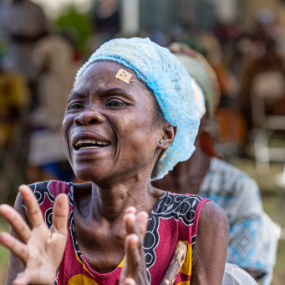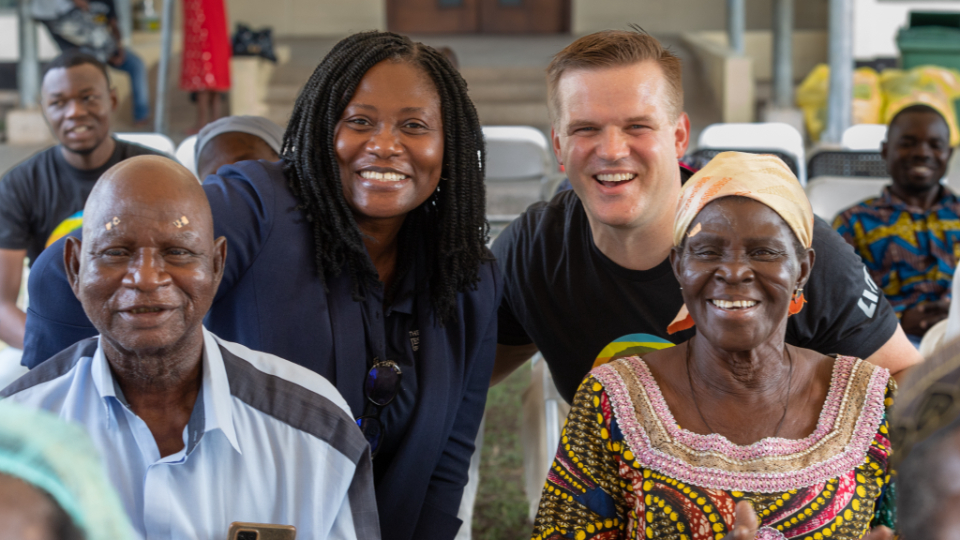
Wa-Outreach
Elizabeth regains her sight at Wa Outreach in Ghana on May 3, 2023.2023 by Intellectual Reserve, Inc. All rights reserved.Elizabeth was 26 years old, raising two children by herself in Ghana, and she couldn’t see. She had developed cataracts in both eyes, the result of years in the sun, malnutrition, and other factors. For over a year she was unable to work or take care of herself and her children. She was forced to move in with her mother, who had to quit working to provide the assistance Elizabeth required. Her 9-year-old daughter had to quit school to assist in her care. Life was difficult and there didn’t appear to be any hope of it getting better. On May 3, 2023, everything changed for Elizabeth.
During an outreach event in Wa, Ghana, Elizabeth was one of over 500 Ghanaians who received the gift of sight thanks to a collaboration between The Church of Jesus Christ of Latter-day Saints and the Daybreak Vision Project, a non-profit organization with the mission of bringing sight-restoring cataract surgery to those in greatest need. Daybreak was founded in 2020 by Dr. John Welling, Adam Schanz, Jon Mangum and Jason Wernli; lifelong friends, all with deep ties to Africa. Since inception, Daybreak has conducted numerous outreach events and performed thousands of sight saving cataract surgeries in Ghana.
A young boy had congenital cataracts in both eyes. The young boy could only see shadows of people and objects. His family heard about the Daybreak outreach and took him to Wa where surgery was performed on both eyes. He can now see and the gift of sight will allow him to help his family and to succeed in school.
- Wa-Outreach
- Wa-Outreach
- Wa-Outreach
- Wa-Outreach
- Wa-Outreach
- Wa-Outreach
- Wa-Outreach
- Wa-Outreach
- Wa-Outreach
- Wa-Outreach
- Wa-Outreach
- Wa-Outreach
| Temple Square is always beautiful in the springtime. Gardeners work to prepare the ground for General Conference. © 2012 Intellectual Reserve, Inc. All rights reserved. | 1 / 2 |
With equipment procured through a donation from the Church, Daybreak partners with local surgeons, hospitals and institutions, and local government leaders to provide sight-restoring cataract surgery to thousands of Ghanaians. They work with in-country partners to plan high volume outreaches, with a focus on those areas that are most underserved. A screening team is then sent to the target communities. A variety of communication channels will be leveraged to spread the word about the screening campaign, including radio ads, community health workers, political and religious leaders, and vans with mounted bull horns. Once patients have been screened and surgical candidates identified, patients are given a surgery date and arrangements are made to bring them by bus to the outreach location on the appointed day.
Following surgery, the patients will stay overnight at the hospital. On post-operative day one, the eye patches will be removed, and the eyes examined. Patients will be given their post-operative eye drops, educated on the post-operative instructions, and given follow-up appointments.
Patients are returned by bus to their local villages where they undergo one week and one-month post-operative examinations by local community eye health personnel, referring patients back to the host institution as needed.

Wa-Outreach
Marian Esiape, Welfare and Self Reliance Director of the Africa West Area of The Church of Jesus Christ of Latter-day Saints (2nd from left) and John Welling, MD, of Daybreak Vision Project, with two happy patients in Wa, Ghana, May 2023.2023 by Intellectual Reserve, Inc. All rights reserved.Daybreak also provides intensive hands-on training to dozens of Ghanaian eye care personnel with the goal of long-term sustainable eye care in Ghana. “Training the next generation is at the heart of sustainability,” said John Welling M.D., one of the founders of Daybreak. “We aim to provide each resident trainee with an immersive, mentored surgical experience that will broaden their knowledge base, strengthen their skill set, and elevate the quality of care they provide throughout their career.” At the Wa outreach, resident trainees from the Komfo Anokye Teaching Hospital in Kumasi Ghana, performed many of the surgeries under the guidance of their instructors and Daybreak mentors.
The Church also provided funding to increase public awareness about cataract blindness and the impact of sight-restoring cataract surgery through effective advocacy. “The Church is under divine mandate to care for the poor and the needy. Our focus is to collaborate with other humanitarian organizations to create a better life for the people of West Africa,” said Marian Esiape, Welfare and Self Reliance Director for the Africa West Area of the Church of Jesus Christ of Latter-day Saints. “Daybreak’s focus on training local medical personnel and providing public advocacy to encourage self-care and sustainability will bless the lives of West Africans for generations,” she added. Formerly blind patients who have had sight restored are used to advocate for increased awareness and increased support for eye care services.
Daybreak also uses a network of volunteers to support their efforts. At the Wa outreach the surgeries were provided at no cost to the patients, thanks to support from LiveView Technologies, a company based in American Fork, Utah. LiveView also sent a volunteer team to provide non-medical support, such as helping patients navigate the various pre-and post operative stations.
The highlight of the outreach event in Wa, as it is at all outreaches, is the moment the eye patches are lifted, and formerly blind patients can see again. For Elizabeth that meant that she could now take care of her children, her mother could go back to work, and her daughter could go back to school. Although she was initially scared and apprehensive about eye surgery, there was nothing but joy when she saw her children and mother for the first time in over a year. For the young boy it had special meaning, "I can now sit at the back of the classroom at school!"